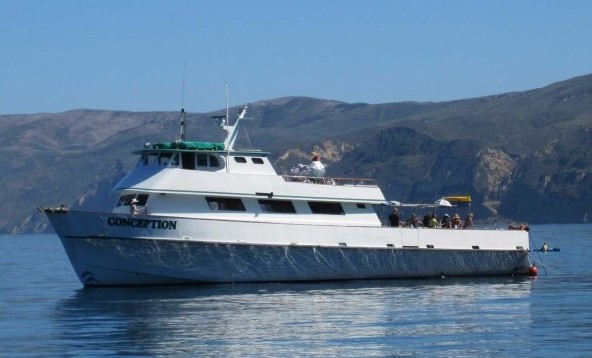Three years after the fire aboard the Conception dive boat, more progress is needed on the safety recommendations the National Transportation Safety Board (NTSB) issued as a result of the investigation.
The Conception was anchored in Platts Harbor, off Santa Cruz Island, California, when it caught fire in the early morning of Sept. 2, 2019. The vessel burned to the waterline and sank less than 100 feet from shore. Tragically, the 34 people asleep below deck were trapped in the bunk room: 33 passengers and one crew member lost their lives.
Following the investigation, the NTSB issued 10 new safety recommendations:
- USCG: Revise Title 46 Code of Federal Regulations Subchapter T to require that newly constructed vessels with overnight accommodations have smoke detectors in all accommodation spaces.
- USCG: Revise Title 46 Code of Federal Regulations Subchapter T to require that all vessels with overnight accommodations currently in service, including those constructed prior to 1996, have smoke detectors in all accommodation spaces.
- USCG: Revise Title 46 Code of Federal Regulations Subchapter T and Subchapter K to require all vessels with overnight accommodations, including vessels constructed prior to 1996, have interconnected smoke detectors, such that when one detector alarms, the remaining detectors also alarm.
- USCG: Develop and implement an inspection procedure to verify that small passenger vessel owners, operators, and charterers are conducting roving patrols as required by Title 46 Code of Federal Regulations Subchapter T.
- USCG: Revise Title 46 Code of Federal Regulations Subchapter T to require all small passenger vessels with overnight accommodations, including those constructed prior to 1996, to provide a secondary means of escape into a different space than the primary exit so that a single fire should not affect both escape paths.
- USCG: Review the suitability of Title 46 Code of Federal Regulations Subchapter T regulations regarding means of escape to ensure there are no obstructions to egress on small passenger vessels constructed prior to 1996 and modify regulations accordingly.
- USCG: Review the suitability of Title 46 Code of Federal Regulations Subchapter T regulations regarding means of escape to ensure there are no obstructions to egress on small passenger vessels constructed prior to 1996 and modify regulations accordingly.
- Passenger Vessel Association, Sportfishing Association of California, National Association of Charterboat Operators: Until the US Coast Guard requires all passenger vessels with overnight accommodations, including vessels constructed prior to 1996, to have smoke detectors in all accommodation spaces, share the circumstances of the Conception accident with your members and encourage your members to voluntarily install interconnected smoke and fire detectors in all accommodation spaces such that when one detector alarms, the remaining detectors also alarm.
- Passenger Vessel Association, Sportfishing Association of California, National Association of Charterboat Operators: Until the US Coast Guard requires small passenger vessels with overnight accommodations to provide a secondary means of escape into a different space than the primary exit, share the circumstances of the Conception accident with your members and encourage your members to voluntarily do so.
- USCG: Require all operators of U.S.-flag passenger vessels to implement safety management systems, taking into account the characteristics, methods of operation, and nature of service of these vessels, and, with respect to ferries, the sizes of the ferry systems within which the vessels operate.
The NTSB also reiterated its 2005 recommendation for the Coast Guard to require all U.S.-flag passenger vessels to implement a safety management system. Since 2005, the NTSB has investigated four passenger vessel accidents, including the Conception, where the lack of an SMS was an issue.
While I am encouraged by the progress that has been made, more work needs to be done. NTSB will continue to push until these recommendations are fully implemented
said Chair Jennifer Homendy.
Of the three associations with members operating small passenger vessels with overnight accommodations, only the Passenger Vessel Association has taken sufficient action to satisfy the NTSB recommendations. The Sportfishing Association of California and the National Association of Charterboat Operators have yet to respond.
The Elijah E. Cummings Coast Guard Authorization Act of 2020 mandates that the USCG carry out all of the NTSB recommendations issued or reiterated as a result of the Conception investigation.
Furthermore, NTSB encourages operators of vessels with overnight accommodations to:
- Install smoke detectors in all accommodation spaces and ensure they are interconnected so when one detector goes off, they all do. While the Conception berthing space did have smoke detectors, they were the only ones on the vessel and would only alarm locally in the berthing space and not throughout the entire vessel.
- Ensure that the primary and secondary emergency escape paths do not lead to the same space, which can be blocked by a single hazard. The Conception had two means of escape from the lower deck bunk room, but both led into the salon on the deck above, which was filled with heavy smoke and fire. Tragically, the salon compartment was the only escape path to the outside weather deck. Because there was fire in the salon, the passengers and a crew member were trapped below.
- Vessel owners and operators should review the requirements of the Certificate of Inspection (COI) and ensure they adhere to the conditions of operation such as designating and maintaining roving patrols at all times when bunks or berthing spaces are occupied. Our investigation found that the Conception fire was uncontrollable by the time it was discovered because no crew members were assigned roving patrol duties on board the Conception, even though it was a condition of operation on their COI.
- Keep escape routes unobstructed at all times.
- Implement a safety management system. Had an SMS been implemented, Truth Aquatics could have identified unsafe practices and fire risks on the Conception and taken corrective action before the tragedy occurred.






























































